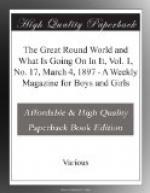The records of the Republic show that boys who have gone into Freeville rough and bad, and have commenced their citizenship with idling and thieving, have in a few weeks become law-abiding citizens.
So successful has this summer Republic been, that Mr. George has made up his mind to keep it going the whole year round.
Over two hundred children were housed there last summer, and thirty-four boys are passing the winter there.
Through the generosity of some wealthy people, a farm of forty-eight acres has been bought for the Republic, and this spring and summer it is intended to make room for a much greater number of “citizens.”
The Republic is supported by subscriptions, and the treasurer wants to raise ten thousand dollars, to carry out the many fine ideas Mr. George has in mind for this summer.
England, Germany, and Japan have made inquiries into the work at Freeville, and Mr. George hopes that republics may be started in other countries.
Pennsylvania, Massachusetts, and Illinois are starting republics of their own, and Mr. George has had word from the Junior Republic of California, that the plan is in working order there, and doing exceedingly well.
GENIE H. ROSENFELD.
THE SCHUBERT CENTENNIAL.
A Schubert celebration was held in Vienna on the hundredth anniversary of the great composer’s birth, which occurred on January 31st.
Concerts of Schubert music were given, and an exhibition of his manuscripts and letters.
An old battered piano which he had used was also shown. This is the only article which belonged to him that is known to exist, as he died in extreme poverty. It seems sad that his genius was not properly appreciated until after his death, and that he who was to give so much to the world of music should have been denied all but the barest necessities.
We publish an account of his life, written especially for THE GREAT ROUND WORLD.
FRANZ SCHUBERT.
Eighteen hundred and ninety-seven is the centennial year of Franz Schubert, the great composer, who was born in Vienna on the 31st of January, 1797. He was of humble lineage. His father, who also bore the name of Franz, was the son of a peasant, who studied in Vienna, and became assistant to his brother, a schoolmaster. He married Elizabeth Vitz, who had been in service as a cook in Vienna. Franz Peter Schubert was the thirteenth of a family of fourteen children, nine of whom died in infancy. His love of music was apparent when he was very young. A relative often took him to visit a pianoforte warehouse, and there, and on an old worn-out piano at home, the child studied his first exercises without a master. At the age of seven he had a teacher, Michael Holzer, who used to cry out, “When I wish to teach him anything, he always knows it already.” When he was eleven years old he was employed as a solo singer and violin player in a church. A little later his father succeeded in getting him a position in the Emperor’s Chapel, and he thus became a pupil in a music school, which was called the “Convict.”




